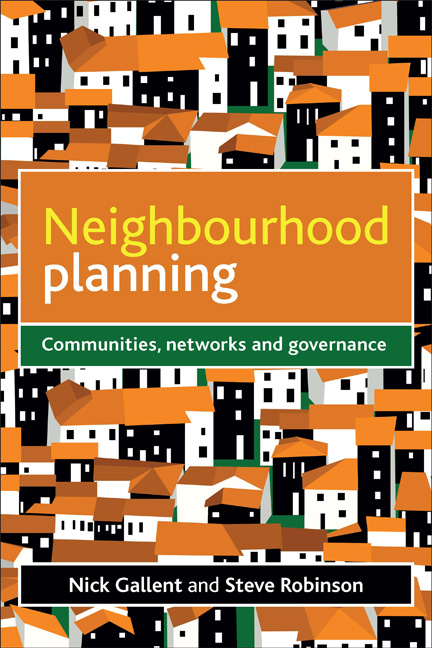Book contents
- Frontmatter
- Dedication
- Contents
- List of figures, images and table
- Abbreviations
- Acknowledgements
- Authors’ note
- Part One Democracy, planning and localism
- Part Two Capacity building and community-based planning
- Part Three The interface with policy actors
- Part Four Neighbourhood planning, leadership and democratic renewal
- References
- Index
six - Power, capacity and collaborative planning
Published online by Cambridge University Press: 07 September 2022
- Frontmatter
- Dedication
- Contents
- List of figures, images and table
- Abbreviations
- Acknowledgements
- Authors’ note
- Part One Democracy, planning and localism
- Part Two Capacity building and community-based planning
- Part Three The interface with policy actors
- Part Four Neighbourhood planning, leadership and democratic renewal
- References
- Index
Summary
[W]e will create a new system of collaborative planning by: giving local people the power to engage in genuine local planning through collaborative democracy – designing a local plan from the ‘bottom up’, starting with the aspirations of neighbourhoods. (Conservative Party, 2009, p 3, emphasis added)
The earlier chapters of this book outlined how the established concepts of ‘collaborative governance’ and ‘spatial planning’ were embraced in the UK as a means of deepening and broadening institutional capacity by enabling the development of coordinated local responses to an increasingly complex set of societal and governance challenges. A decade ago, Allmendinger and Tewdwr-Jones (2002) noted that these concepts were part of a Third Way in the process of governance, which itself was short-hand for the idea of a ‘new social democracy’, motoring Labour's reform agenda (and now propelling the localism of the UK coalition government). The principal proponent of the Third Way and Tony Blair's ‘favourite academic’ (Carter, 2004, p 54), Anthony Giddens, joined others in arguing for democratic renewal through a revival of civil society (Giddens, 1998) that would involve wider and deeper public participation, building capacity and social capital within communities, empowering people to have a say in the way decisions are taken and services delivered, and generally establishing a new contract and relationship between public, private and community actors. Only through this mode of collaborative governance – built on the established idea of communicative action with its links into collaborative planning – could an attempt be made to address the ‘disaggregation’ of state and society noted in Chapter Two.
Collaborative planning and networks
The foundations of the collaborative planning approach are found in the work of Habermas (1984), who forwarded the concept of ‘communicative action’ as a way of explaining human rationality. Habermas was critical of what he considered to be the one-sided process of modernisation, which had been dominated by ‘experts’ and scientific rationalisation, and which he argued had resulted in society being increasingly ‘administered’ at a level that was ever-more remote from the lives of ordinary people. Participatory democracy and the ability to openly debate matters of public importance – the fundamental building blocks of a thriving and progressive society – had been nullified through an over-professionalised and closed model of government.
- Type
- Chapter
- Information
- Neighbourhood PlanningCommunities, Networks and Governance, pp. 69 - 78Publisher: Bristol University PressPrint publication year: 2012



